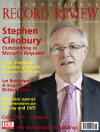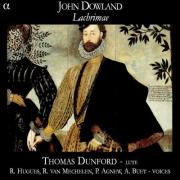Texte paru dans: / Appeared in:
*

International Record Review - (06/2013)
Pour
s'abonner / Subscription information
Alpha
ALP187

Code-barres / Barcode : 3760014191879
Consultez toutes les évaluations recensées pour ce cd
~~~~ Reach all the evaluations located for this CD
Thomas Dunford is the son of two outstanding players of the viola da gamba, Jonathan Dunford and Sylvia Abramowicz, Americans long-resident in Paris. He was born as recently as 1988 but bas been playing the lute since the age of nine, when his first teacher was Claire Antonini. He is an exceptionally gifted lutenist and while he has appeared on disc with several Early Music ensembles, this is his first recording as director and soloist. I have been eagerly awaiting its release and therefore am very sorry to have to report that, on balance, it is not a success.
On the credit side of the ledger, the handful of solo lute pieces are quite as well played by Dunford as one would have hoped. Playing a superb renaissance-style instrument made by the Bristol luthier Paul Thomson, Dunford is remarkably confident and accomplished for such a young musician. As befits the title of the disc, ‘Lachrimae’, there is an emphasis on the sombre side of Dowland’s solo lute oeuvre and I am not sure I have ever heard the Melancholy Galliard or Fortune (based on the ballad ‘Fortune my Foe’) played so affectingly. His performance of the very often recorded title piece is about the best I have heard: every phrase is perfectly balanced, every inflection adds to the sense of utter despair that this musical soliloquy so famously represents. Among the solo lute pieces, the only representative of the more flamboyant side of Dowland is the Frog Galliard and, even here, Dunford’s virtuosity is matched with easy grace.
If only these same qualities were to be found in the vocal works. Dunford has chosen seven of Dowland’s best and most popular songs and decided to perform them in a variety of ways, making full use of the performance options Dowland allowed. These days, such songs are most commonly heard sung by a solo voice with lute, sometimes with viola da gamba, or even with viol consort. Dowland songs are so often sung by solo countertenors these days (and often very well) that it is worth remembering that, according to a recent article by David Hill for Early Music Review, this is a purely modern practice. The composer published his songs in four voices, but performance by solo soprano or tenor voice would have been normal. To be sung by an alto falsettist (that is, a countertenor), the songs need to be transposed downwards usually by a fourth and according to Hill there is no historical evidence that this ever occurred in Dowland’s time. -
There is no countertenor on this disc. Instead, the vocal forces are one soprano, two tenors and a bass. Some songs are performed by all four voices, some by pairing soprano and bass or tenor and bass. The opening song, the ebullient Come again, is sung in the first and last verses by tutti and, in between, each verse is sung by a different soloist. This is not the first time such an approach has been taken with Dowland songs. I can recall Boston Camerata and the Consort of Musicke (some time after their complete works edition) performing them this way. But it is a rare enough approach that these performances shed new light on some very familiar songs.
Unfortunately, at least two of the four singers involved in the project are quite unsuitable for renaissance music. The voices of both Ruby Hughes (soprano) and Alain Buet (bass) are beset by an ugly and intrusive near-constant vibrato. In the case of Buet, age may be at least partly responsible for the frequent tremolo. However, Hughes is a young singer, who, as is evident in the occasional pure note, is quite capable of turning off the wobble when she chooses; so I am afraid she is the more culpable. Listening to those songs in which she appears (sadly most of them), the shaky top line is reminiscent of early Deller Consort performances — it is as if Emma Kirkby had never existed.
The outstanding singer here is tenor Paul Agnew, whose mid-1990s recordings of Dowland with lutenist Christopher Wilson on the Metronome label have never been bettered. In the rare glimpses allowed on this recording, he is still an exceptionally good interpreter of lute songs. The other tenor is Remoud Van Mechelen, who is rather good, if not as at ease in this repertory as Agnew. However, these two good Early Music voices are all but drowned out by the other two singers, who would have been more at home in the old D’Oyly Carte Cornpany.
There is even more to rue with this disc. As has become quite the fashion on CDs lately, there is an uncredited bonus track after the final song. However, it is not another Dowland piece but some dreary pop song with lute and tenor (I presume Van Mechelen, but it could be Dunford himself). Nail in the coffin, I’m afraid.
Cliquez l'un ou l'autre
bouton pour découvrir bien d'autres critiques de CD
Click either button for many other reviews


